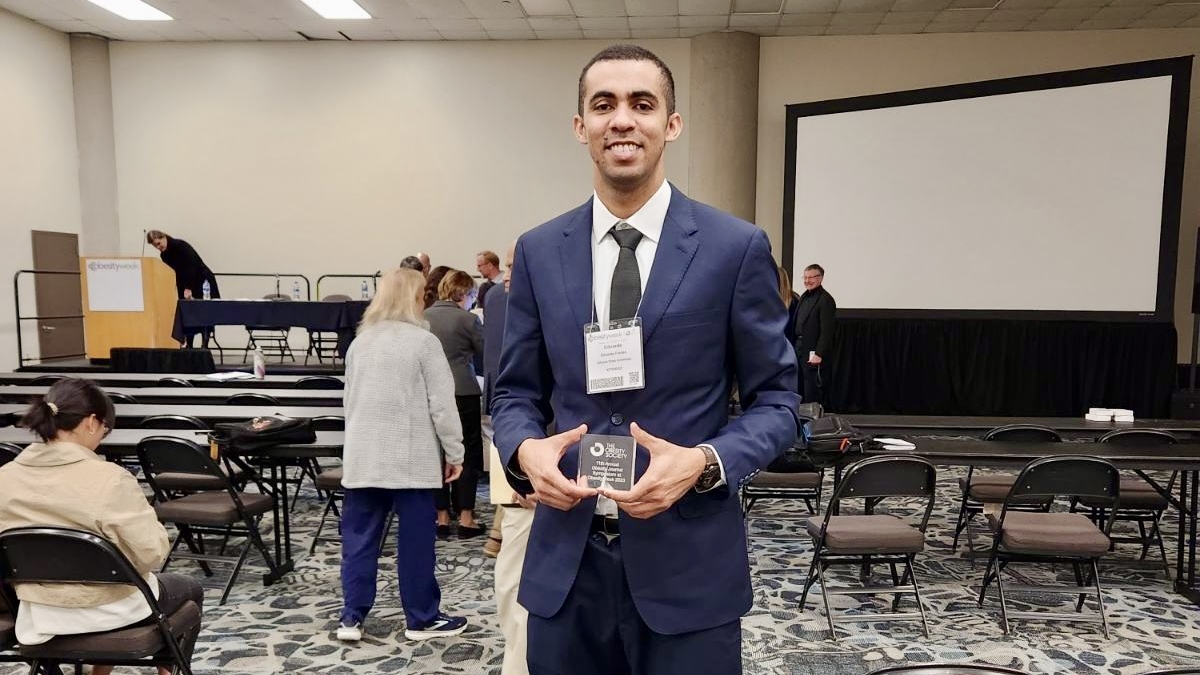New study investigates how obesity impacts skeletal muscle health

Eduardo Freitas presented his research at the Obesity Journal Symposium this fall. Courtesy photo
Obesity is a growing health problem that affects the overall health, well-being and health care costs of millions worldwide. In the United States alone, it is estimated that nearly 40% of adults have obesity, according to the Center for Disease Control and Prevention.
Obesity has several significant health implications and can lead to heart disease, several types of cancers, diabetes, changes in muscle function and more.
Eduardo Freitas, a postdoctoral fellow in the School of Life Sciences at Arizona State University, is working with Associate Professor Christos Katsanos in the Human Obesity and Metabolism Laboratory to measure the expression of insulin-like growth factor 1 (IGF-1) and its splice variants in the skeletal muscle of people with obesity.
“There is data from our lab and other labs showing that protein synthesis in skeletal muscle is lower in people with obesity. However, our understanding of the biological mechanisms sustaining this response in the muscle of humans with obesity remains unknown,” Freitas said. “With that in mind, we decided to measure IGF-1 expression and its relation to protein synthesis in the muscle of subjects with obesity and lean controls.”
IGF-1 regulates protein synthesis, or the process of creating protein molecules, in skeletal muscles. In this study, Freitas and his research team, Drs. Lori Roust and Eleanna De Filippis at the Mayo Clinic, found a reduced IGF-1 expression and lower protein synthesis in the muscles of individuals with obesity.
Muscle plays a vital role in overall health and combating obesity-related health issues.
“A typical problem with obesity is insulin resistance, which impairs people’s ability to take up and metabolize glucose in muscle,” Freitas said. “Muscle is a primary site for glucose disposal, so improving muscle health means concurrently improving the metabolic health of a person with obesity, including insulin sensitivity, for example.”
The study revealed new insights into the relationship between IGF-1 expression and mitochondrial protein synthesis within muscles.
“We found high correlations between these two variables, which demonstrates that IGF-1 plays not only a role in overall muscle protein synthesis, but also potentially an even bigger role in mitochondrial protein synthesis, which is important,” Frietas said. “The mitochondria are commonly known as the ‘powerhouse' of the cell; therefore, the effects of muscle IGF-1 may extend to carbohydrate and lipid metabolism and consequently insulin sensitivity.”
Freitas presented his research at the Obesity Journal Symposium this fall, where his research article was selected as one of the top five articles for the symposium. He also received the 2023 Rolls-Simons Award for his publication.
“Attending the symposium and presenting my research was an excellent experience and a great opportunity to connect with colleagues studying obesity and get some insight into what other people are studying within the field,” he said.
Freitas and his team recently submitted a research grant application to the National Institutes of Health. This funding would allow them to obtain a deeper understanding of the underlying molecular mechanisms that sustain lower IGF-1 in the muscles of humans with obesity, as well as its links to impaired protein synthesis.
Video courtesy The College of Liberal Arts and Sciences
More Science and technology

Breakthrough copper alloy achieves unprecedented high-temperature performance
A team of researchers from Arizona State University, the U.S. Army Research Laboratory, Lehigh University and Louisiana State…

4 ASU researchers named senior members of the National Academy of Inventors
The National Academy of Inventors recently named four Arizona State University researchers as senior members to the prestigious…

Transforming Arizona’s highways for a smoother drive
Imagine you’re driving down a smooth stretch of road. Your tires have firm traction. There are no potholes you need to swerve to…

